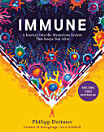Compendium of 3D Bioprinting Technology
Acerca deste libro electrónico
This book provides comprehensive coverage of the application of 3D bioprinting technology. It is a collection of contributions by experts with cutting-edge know-how. The book is meant for medical practitioners, pharma companies, CROs, product developers, students, researchers, academicians, policymakers and practitioners.
Acerca do autor
Dr. Mohanan is a Fellow of the National Academy of Science, India and Royal Society of Biologists, UK. He was a JSPS Postdoctoral Fellow at the University of Tsukuba, Japan in the field of Neurotoxicity. As a toxicologist, he has been intimately associated with all the medical devices/technologies developed at SCTIMST (Govt. of India). Currently he heads both the Division of Toxicology and Dept. of Applied Biology. Dr. Mohanan is a member in the Empowered Committee on the 'Rapid Response Regulatory Framework for COVID-19 to deal with applications for development of vaccines, diagnostics, prophylactics and therapeutics and an expert member in the statutory Committee, RCGM, DBT, New Delhi. Mohanan is also serving as an expert member at the DST, SERB, DBT, ICMR, CSIR and FSSAI Scientific committees. He is an Expert member at the Joint Food and Agriculture Organization of the United Nations and the World Health Organization (JECFA), USA. Mohanan is a member in the Scientific Advisory Committee of ICMR-NARFBR, Hyderabad. He is a Visiting Professor and Visiting Researcher at Toyo University, Japan and a Certified Biological Safety Specialist. Mohanan is an Adjunct Professor at the Indian Institute of Technology, Hyderabad and Jamia Hamdard University, New Delhi. He received lifetime achievement award from the Society of Toxicology India, for his outstanding contribution in toxicology. The development of Human-on-a-chip is a new mega project, apart from several other externally funded research projects. Patented an ELISA kit for the measurement of pyrogenicity. Mohanan made significant contributions for the development of medical device regulations in India. He received certificate of appreciation from the Hon. Minister of Science and Technology, Govt. of India for his contribution to India getting full adherent status on GLP from OECD. He has authored more than 300 publications, edited 10 books, 5 patent filed and 3 design registrations. Presently he is the Secretary General, Society of Toxicology, India and Vice President, Kerala Academy of Sciences, India.





